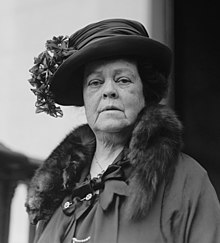
Back ألفا بيلمونت Arabic الفا بيلمونت ARZ Alva Belmont Welsh Alva Vanderbilt Belmont German Alva Belmont Spanish Alva Belmont Estonian Alva Belmont Basque Alva Belmont French Ալվա Բելմոնտ Armenian Alva Belmont Italian
Alva Belmont | |
|---|---|
 Alva Belmont in 1922 | |
| Born | Alva Erskine Smith January 17, 1853 Mobile, Alabama, U.S. |
| Died | January 26, 1933 (aged 80) Paris, France |
| Resting place | Woodlawn Cemetery, Bronx, New York, U.S. |
| Spouses | |
| Children | |
| Relatives | Robert Desha (grandfather) |
Alva Erskine Belmont (née Smith; January 17, 1853 – January 26, 1933), known as Alva Vanderbilt from 1875 to 1896, was an American multi-millionaire socialite and women's suffrage activist. She was noted for her energy, intelligence, strong opinions, and willingness to challenge convention.
In 1909, she founded the Political Equality League to get votes for suffrage-supporting New York State politicians, wrote articles for newspapers, and joined the National American Woman Suffrage Association (NAWSA). She later formed her own Political Equality League to seek broad support for suffrage in neighborhoods throughout New York City, and, as its president, led its division of New York City's 1912 Women's Votes Parade. In 1916, she was one of the founders of the National Woman's Party (NWP) and organized the first picketing ever to take place before the White House, in January 1917. She was elected president of the NWP, an office she held until her death.
She was married twice, to socially prominent New York City millionaires William Kissam Vanderbilt, with whom she had three children, and Oliver Hazard Perry Belmont. Alva was known for her many building projects, including: the Petit Chateau in New York; the Marble House in Newport, Rhode Island; the Belmont House in New York; Brookholt in Long Island; and Beacon Towers in Sands Point, New York.
On "Equal Pay Day," April 12, 2016, Belmont was honored when President Barack Obama established the Belmont-Paul Women's Equality National Monument in Washington, D.C.